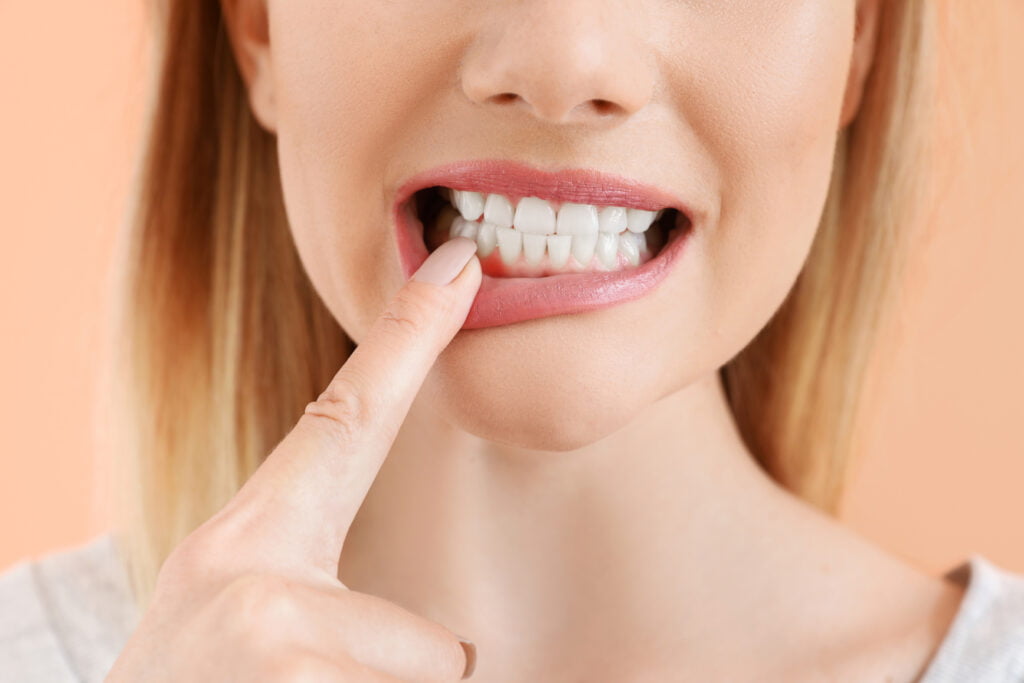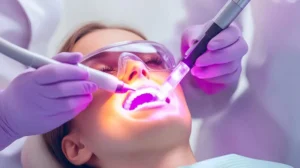Periodontal condition, also known as periodontitis, is an extreme condition characterized by gum infection. It is brought on by bacteria that have been permitted to build up on your teeth and gums for an extended period. Your bones and teeth risk becoming damaged as the periodontal disease progresses. On the other hand, the damage can be controlled if periodontal is treated early and excellent dental hygiene is maintained.
If you have periodontal disease, you should pursue periodontal care immediately.
Stages Of Periodontal Gum Disease
Inflammation is the initial stage of periodontitis, which then progresses to more severe forms.
1st Stage: Gingivitis
Gingivitis is the first stage of periodontal disease, which develops from inflammation in the gums. Whenever you brush or floss your teeth, you may notice that your gums bleed more quickly than usual. This is one of the early warning signs of gingivitis.
What’s more, you might discover that your teeth have changed color. Plaque is the bacterial and food particle buildup on your teeth over time. Even though microbes are always prevalent in your mouth, they do not become potentially dangerous until conditions allow their numbers to increase significantly. If you don’t brush your teeth, floss your teeth, or go to the dentist for regular cleanings, this could happen to your teeth.
2nd Stage: Early Periodontal Disease
In the initial phases of periodontal disease, your gums will begin to recede or pull away from your teeth. It will result in the formation of small pockets between your gums and teeth. The pockets are home to harmful bacteria.
As your immune system strains to fight off the infection, the gum tissue in your mouth begins to recede. You should also expect to experience bleeding when flossing and brushing your teeth, in addition to the potential for bone loss.
3rd Stage: Moderate Periodontal Disease
If periodontal disease is permitted to progress to a moderate stage, you may encounter bleeding and pain around the teeth and gum recession. As this process continues, your teeth will gradually lose their bone structure and become more mobile. Additionally, the condition can cause an inflammatory reaction all over your body.
4th Stage: Advanced Periodontal Disease
When the disease has risen to a more advanced stage, the connective tissue that deteriorates first is the tissue that retains your teeth in place. Your gums, bones, and other tissues that support your teeth are all worsening due to this condition.
If you have advanced periodontitis, you may experience severe pain when you chew, harsh stinky breath, and a foul taste in your mouth. You’ll likely end up with no teeth due to the condition.
How Is The Disease Diagnosed?
During a routine dental consultation, your dentist will be able to recognize the warning signs of periodontal disease at an earlier stage. They can preserve track of your periodontal health over time to guarantee that it does not deteriorate further. Knowing this, you must schedule routine checkups with your dentist to have a screening done.
If there are any pockets on your gums, your dentist may measure them with a probe, which looks like a small ruler. This examination is typically wholly painless.
During a professional cleaning, your dentist will eliminate any plaque, tartar, or both found on your teeth. This is a standard part of the cleaning process. They may also refer you to a periodontist, an expert in the management and therapy of gum disease, for further screening and treatment. Alternatively, they may take dental X-rays themselves.
Consequences Of Periodontal Disease If Left Unattended
If you don’t get treatment for periodontal disease, it can decimate the structures that hold your teeth in place, including the bones in your jaw. Your teeth become more flexible, resulting in their loss or extraction if necessary. Additional periodontal complications include the following:
- Increased likelihood of developing cardiovascular disease, respiratory illness, and diabetes
- A higher likelihood of experiencing difficulties during pregnancy, such as having a baby with low birth weight or developing preeclampsia
- Gum recession and the exposure of the tooth roots
- Migration of your teeth, which could make eating difficult for you
- Painful abscesses
- Foul breath
Periodontal Care
Plaque and bacterial deposits accumulated on your teeth and gums can be removed through periodontal care. Here is how your provider may execute the treatment:
Professional Dental Cleaning
Your dentist will buff your teeth and treat them with fluoride after clearing plaque buildup and tartar from your teeth down to the roots during a professional cleaning. After this, your teeth will be treated with fluoride. It may be necessary to thoroughly clean any periodontal pockets that have developed before healing can occur.
Scaling and root planing is an extensive cleaning method that will help scrape off tartar and eliminate rough patches on the tooth root where bacteria accumulate.
Antibiotic Medications
If your gum infection has been going on for a while and regular cleanings haven’t helped, your dentist may recommend antibiotics as an additional treatment option. The antibiotic may arrive in the form of a gel, mouthwash, or even a tablet or capsule that you take orally.
Oral Hygiene Practices
Cleaning your teeth and gums regularly is one of the steps that your dental care provider will instruct you to take to lessen the number of bacteria in your mouth. Your dentist will advise you on the correct way to brush your teeth and use dental floss, and they may also suggest using other products for oral hygiene, such as a mouthwash.
Surgery
If periodontal pockets can still be seen, they might suggest undergoing surgery or one of the other available treatments.
Suppose the inflammation does not subside in areas that cannot be reached by flossing or brushing. In that case, your dentist may propose that you undergo a surgical procedure known as flap surgery to clean deposits that have accumulated under your gums. Your gums will be cut back, and the roots of your teeth will be cleaned while you are under anesthesia. After that, your gums will be stitched back into position.
If ever you experience any bone loss, a procedure known as bone grafting may be performed concurrently with flap surgery to regenerate the bone that has been lost.
Takeaway
The earlier you find out about your periodontal disease, the sooner you can address it with periodontal care and prevent any more pains and aches ahead of you. So if you are interested in managing your periodontal disease, or want a gum inspection, contact us and visit our clinic, Luth And Heideman Center For Dental Care. We offer services that aim to address the oral concerns of our patients.






